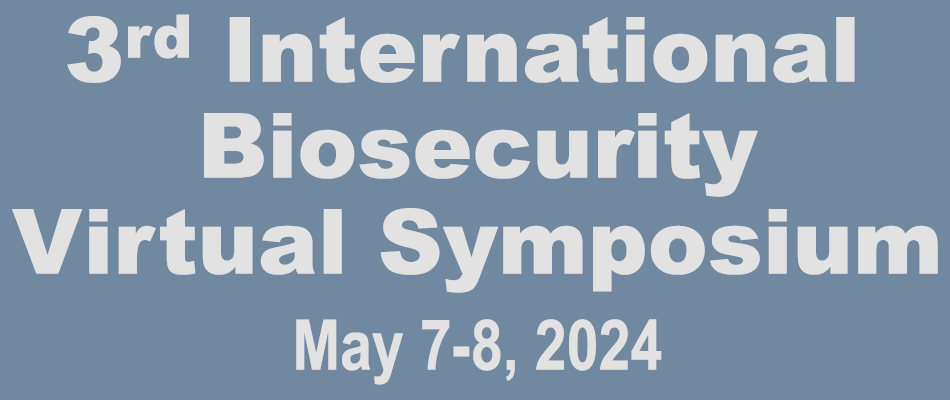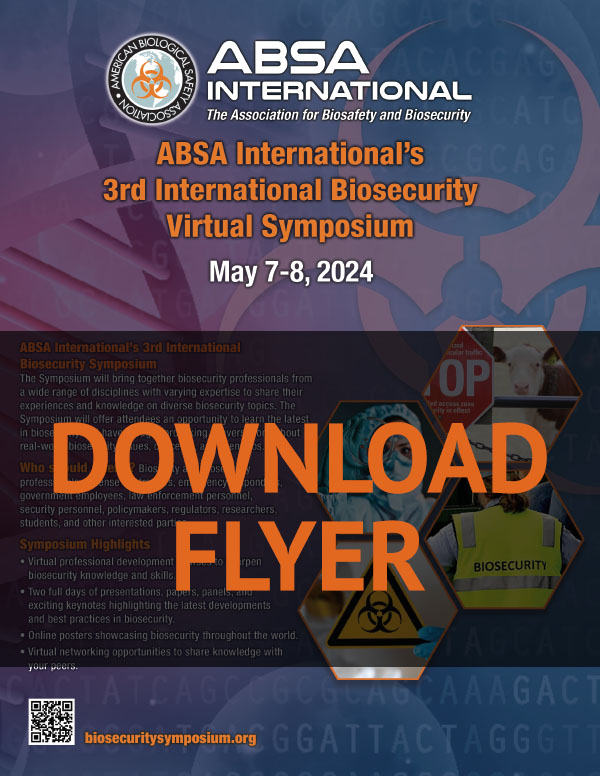Recording of the webinar that took place April 17 and April 19, 2024.
1V. Personnel Security in Laboratory Biosecurity Programs
Ben Perman, CDR(Ret.), PhD, RBP(ABSA), Biomedical Advanced Research and Develoment Authority (BARDA), Washington, DC
Lindsay Odell, PhD, MAJ—U.S. Army Reserve, U.S. Army Medical Research Institute of Infectious Diseases (USAMRIID), Fort Detrick, MD
Personnel security is comprised of security measures focused on people and behaviors rather than typical physical barriers approaches. Personnel security can be thought as the “administrative controls” in any advanced security program. This course will teach administration, management, and researchers the basic principles of threat assessment and introduce participants to the role of comprehensive personnel security in a laboratory biosecurity programs. The course is intended to give participants a basic tool-kit that will allow them to implement successful comprehensive insider threat mitigation strategies using personnel security approaches at their home institutes and to convey concepts in personnel security to their colleagues. Participants will be presented with relevant case studies in order to learn about relevant threats in the biomedical and health sectors. Participants will learn about all aspects of personnel security including: suitability, reliability, peer and self reporting strategies, threat assessment, OPSEC, INFOSEC, and an introduction to elicitation, manipulation and surveillance awareness. These concepts will be put in to practice in interactive, live role-playing scenarios that include interview tactics, deception detection elicitation and surveillance detection. Regulatory issues relevant to implementation of personnel security management programs, in particular changes to the Select Agent Regulations pertaining to Tier 1 agents, will also be discussed.
Objectives:
- Identify the types of threats posed to biomedical research, public health and clinical diagnostic facilities, and institutions
- Describe some of the tools that can be used to assess these threats
- Identify the main components of laboratory security programs
- Describe how each mitigates the threats and the unique role that personnel security programs play in insider threat mitigation
- Summarize the purpose, requirements and major components of personnel security programs
Suggested Background: None
Target Audience: All Safety and Security Professionals, Operations Personnel (Front Line, Laboratory, Support Staff, etc.), Security Specialists
Audience Level: Basic
Course Length: 8 hours (two 4-hour live sessions with a 30-minute break each session)
This course has been approved for 1 CM points toward RBP/CBSP recertification. ABSA International is approved as a provider of continuing education programs in the clinical laboratory sciences by the ASCLS P.A.C.E.® Program. This course is approved for 8.0 P.A.C.E.® contact hours.
Course Fees
ABSA Members: $550
Non-Members: $650
Registration for the live webinar must be completed 1 business day prior to the start of the training.
Registrations received after will receive access to the recording only.
Recordings are available for purchase 90 days after the start of the course and must be completed 60 days after purchase.
Recorded webinar participants will receive their course information within 10 business days of registration. Participants will have 60 days to complete the course on the ABSA International Training Site. An extension of 30 days can be purchased for $50 per course prior to the expiration date of the course. The regular course fee will be applicable after the expiration date. The course is FOR INDIVIDUAL USE ONLY.
Access to the course and survey is based on individual email addresses. Participants are encouraged to print out materials prior to completing the module to have materials for review post expiration date.
These courses are recordings of previously held live webinar sessions. The course content will be self-paced in which the participant will view the session recordings, complete the pre- and post-course assessments, and complete and/or open all modules within the course content including the course evaluation. Completion of these items is necessary in order to receive the course certificate and associated points/contact hours.
**Please note**: once the participant has viewed the session recordings, send an email to [email protected] with the course name in the subject line. In the email state what session(s) the participant viewed so the ABSA Education Department can mark the attendance for the course. Once the course certificate has been issued, the participant will continue to have access to the course until their expiration date. No extensions can be purchased.
Cancellation Policy
There will be a $25 cancellation fee per course purchased. If the participant has been enrolled in the course and logging in has occurred, no refund will be granted.
Recording of the webinar that took place April 30 and May 3, 2024
2V. Tactical Implementation of Biosecurity Principles: An Advanced, Scenario-Driven Course on Risk and Threat Management Programs
Ryan Burnette, PhD, Merrick & Company, Greenwood Village, CO
Lauren Richardson, DVM, MPH, DACVPM, Merrick & Company, Greenwood Village, CO
Chuck Tobin, AT-RISK International, Reston, VA
A distinguishing factor between security and biosecurity programs is the fact that biosecurity programs are focused on assets that are biological in nature. This brings forth unique distinctions in implementing risk- and threat-based approaches to prevent the release, loss, or theft of these assets. This advanced workshop will challenge attendees to fully analyze a single biosecurity driven scenario through a series of risk and threat management decision-making. Participants will learn the principles of biosecurity, which set it apart from traditional security, by applying tactical methodology to analysis of a real-world biosecurity case study. The outcomes of this intensive course will be identification of biosecurity-specific risk and threats, their corresponding prioritization against a mitigation plan, approaches for blending these inputs for comprehensive biorisk management, and finally, an integrated biosecurity plan. Participants will leave the course with tools that will be applicable to their host institutions for future engagements building effective integrated biosecurity plans against scenarios.
Objectives:
- Describe stakeholder roles in biosecurity planning and assessment as part of a comprehensive biorisk management program
- Recognize, assess, and develop mitigations for risks, threats, and vulnerabilities to protect biological materials and other laboratory assets from unauthorized access, loss, theft, misuse, diversion, or intentional release
- Develop strategies for prioritization and communication of needs associated with implementing an integrated biosecurity plan
Suggested Background: None
Target Audience: All Biosafety and Biosecurity Professionals
Audience Level: Advanced
Course Length: 8 hours (two 4-hour live sessions with a 30-minute break each session)
This course has been approved for 1 CM points toward RBP/CBSP recertification. ABSA International is approved as a provider of continuing education programs in the clinical laboratory sciences by the ASCLS P.A.C.E.® Program. This course is approved for 8.0 P.A.C.E.® contact hours.
Course Fees
ABSA Members: $550
Non-Members: $650
Registration for the live webinar must be completed 1 business day prior to the start of the training.
Registrations received after will receive access to the recording only.
Recordings are available for purchase 90 days after the start of the course and must be completed 60 days after purchase.
Recorded webinar participants will receive their course information within 10 business days of registration. Participants will have 60 days to complete the course on the ABSA International Training Site. An extension of 30 days can be purchased for $50 per course prior to the expiration date of the course. The regular course fee will be applicable after the expiration date. The course is FOR INDIVIDUAL USE ONLY.
Access to the course and survey is based on individual email addresses. Participants are encouraged to print out materials prior to completing the module to have materials for review post expiration date.
These courses are recordings of previously held live webinar sessions. The course content will be self-paced in which the participant will view the session recordings, complete the pre- and post-course assessments, and complete and/or open all modules within the course content including the course evaluation. Completion of these items is necessary in order to receive the course certificate and associated points/contact hours.
**Please note**: once the participant has viewed the session recordings, send an email to [email protected] with the course name in the subject line. In the email state what session(s) the participant viewed so the ABSA Education Department can mark the attendance for the course. Once the course certificate has been issued, the participant will continue to have access to the course until their expiration date. No extensions can be purchased.
Cancellation Policy
There will be a $25 cancellation fee per course purchased. If the participant has been enrolled in the course and logging in has occurred, no refund will be granted.
Recording of the webinar that took place April 22 and April 25, 2024.
3V. Using the Incident Command System for Responding to Biosecurity Incidents
Roger Laferriere, Incident Cmdr., Op. Section Chief, EMT, National Institute of Health, Hamilton, MT
Kaci Vandalen, MS, National Institute of Allergy and Infectious Diseases, Fort Collins, CO
Brian Noble, MS, CEM, CBCP, National Institute of Allergy and Infectious Diseases, Rockville, MD
The Incident Command System (ICS) is the national gold standard for responding to any size incident in the United States. President George W. Bush mandated its use for all Federal Agencies and strongly recommended its use at all levels of government and within private organizations. The authors of this course have a significant amount of ICS experience, including the highest level of qualification in ICS: Type 1 Incident Commander. They have successfully used ICS in real-life laboratory incidents and Biosecurity exercises. The instructors intend to give the participants an overview of ICS and enough information to incorporate the system into their plans, training, and exercises. This will enable participants to begin maximizing response effectiveness and efficiency during a real laboratory incident.
Objectives:
- Summarize the history, structure, and processes of the Incident Command System
- Restate the ICS process and how ICS allows incident management teams and emergency responders to proactively plan and respond to a laboratory incident
- Apply strategies for incorporating ICS in facility safety/security plans, exercises, and training
Suggested Background: FEMA IS-100C and IS-200C
Target Audience: All Safety and Security Professionals, Operations Personnel (Front Line, Laboratory, Support Staff, etc.)
Audience Level: Intermediate
Course Length: 8 hours (two 4-hour live sessions with a 30-minute break each session)
This course has been approved for 1 CM points toward RBP/CBSP recertification. ABSA International is approved as a provider of continuing education programs in the clinical laboratory sciences by the ASCLS P.A.C.E.® Program. This course is approved for 8.0 P.A.C.E.® contact hours.
Course Fees
ABSA Members: $550
Non-Members: $650
Registration for the live webinar must be completed 1 business day prior to the start of the training.
Registrations received after will receive access to the recording only.
Recordings are available for purchase 90 days after the start of the course and must be completed 60 days after purchase.
Recorded webinar participants will receive their course information within 10 business days of registration. Participants will have 60 days to complete the course on the ABSA International Training Site. An extension of 30 days can be purchased for $50 per course prior to the expiration date of the course. The regular course fee will be applicable after the expiration date. The course is FOR INDIVIDUAL USE ONLY.
Access to the course and survey is based on individual email addresses. Participants are encouraged to print out materials prior to completing the module to have materials for review post expiration date.
These courses are recordings of previously held live webinar sessions. The course content will be self-paced in which the participant will view the session recordings, complete the pre- and post-course assessments, and complete and/or open all modules within the course content including the course evaluation. Completion of these items is necessary in order to receive the course certificate and associated points/contact hours.
**Please note**: once the participant has viewed the session recordings, send an email to [email protected] with the course name in the subject line. In the email state what session(s) the participant viewed so the ABSA Education Department can mark the attendance for the course. Once the course certificate has been issued, the participant will continue to have access to the course until their expiration date. No extensions can be purchased.
Cancellation Policy
There will be a $25 cancellation fee per course purchased. If the participant has been enrolled in the course and logging in has occurred, no refund will be granted.
Recording of the webinar that took place May 6, 2024.
4V. Using One Health to Advance Biosecurity
Susan Harper, DVM, MS, DACLAM, DACVPM, RBP (ABSA), NIH Office of Animal Care and Use, Bethesda, MD
Agricultural biosecurity is a critical component of the One Health concept. It includes various strategies designed to safeguard the health and welfare of agriculturally important animals, the environment, and society in general by preventing infections and their spread among these species, humans, and nontarget species, including wildlife. Increased movement of live animals and their products, as well as the growing trend towards intensification and expansion of animal production systems, represents a significant risk to food supply chains, public health, and the economy due to the possible emergence and spread of exotic animal pests and pathogens, zoonotic diseases, and foodborne agents. Effective management and control of these challenging and complex risks requires application of core principles and cohesive strategies that emphasize sustainability through improved husbandry and health management practices.
Objectives:
- Restate how agricultural biosecurity relates to “One Health”
- Discuss common biosecurity risks encountered in agricultural production
- Review effective management and control strategies to minimize risk to various agricultural sectors
Suggested Background: None
Target Audience: All Safety and Security Professionals, New Biosafety and Biosecurity Professionals, Veterinarians, Facility Managers
Audience Level: Intermediate
Course Length: 4 hours (one 4-hour live session with a 30-minute break)
This course has been approved for 0.5 CM points toward RBP/CBSP recertification. ABSA International is approved as a provider of continuing education programs in the clinical laboratory sciences by the ASCLS P.A.C.E.® Program. This course is approved for 4.0 P.A.C.E.® contact hours.
Course Fees
ABSA Members: $350
Non-Members: $450
Registration for the live webinar must be completed 1 business day prior to the start of the training.
Registrations received after will receive access to the recording only.
Recordings are available for purchase 90 days after the start of the course and must be completed 60 days after purchase.
Recorded webinar participants will receive their course information within 10 business days of registration. Participants will have 60 days to complete the course on the ABSA International Training Site. An extension of 30 days can be purchased for $50 per course prior to the expiration date of the course. The regular course fee will be applicable after the expiration date. The course is FOR INDIVIDUAL USE ONLY.
Access to the course and survey is based on individual email addresses. Participants are encouraged to print out materials prior to completing the module to have materials for review post expiration date.
These courses are recordings of previously held live webinar sessions. The course content will be self-paced in which the participant will view the session recordings, complete the pre- and post-course assessments, and complete and/or open all modules within the course content including the course evaluation. Completion of these items is necessary in order to receive the course certificate and associated points/contact hours.
**Please note**: once the participant has viewed the session recordings, send an email to [email protected] with the course name in the subject line. In the email state what session(s) the participant viewed so the ABSA Education Department can mark the attendance for the course. Once the course certificate has been issued, the participant will continue to have access to the course until their expiration date. No extensions can be purchased.
Cancellation Policy
There will be a $25 cancellation fee per course purchased. If the participant has been enrolled in the course and logging in has occurred, no refund will be granted.



